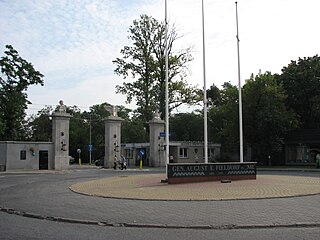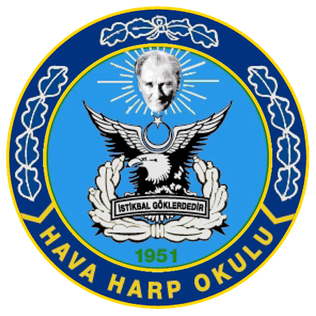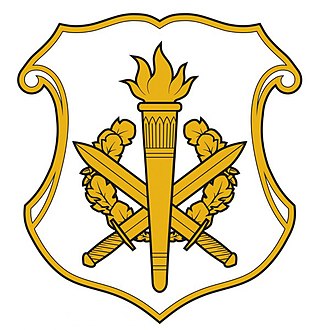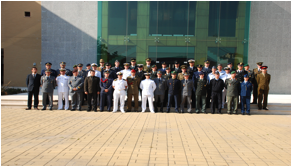M-learning or mobile learning is a form of distance education where learners use portable devices such as mobile phones to learn anywhere at anytime. The portability that mobile devices provide allow for learning anywhere, hence the word "mobile" in "mobile learning". M-learning devices include computers, MP3 players, mobile phones, and tablets. M-learning can be an important part of informal learning.

The National Defence University of Warsaw was the civil-military highest defence academic institution in Poland, located in Warszawa–Rembertów. In 2016 it was succeeded by the War Studies University.
Staff colleges train military officers in the administrative, military staff and policy aspects of their profession. It is usual for such training to occur at several levels in a career. For example, an officer may be sent to various staff courses: as a captain they may be sent to a single service command and staff school to prepare for company command and equivalent staff posts; as a major to a single or joint service college to prepare for battalion command and equivalent staff posts; and as a colonel or brigadier to a higher staff college to prepare for brigade and division command and equivalent postings.
The Indian Defence services have established numerous academies and staff colleges across India for the purpose of training professional soldiers in military sciences, warfare command and strategy, and associated technologies.

The Turkish Air Force Academy (TAFA) is a co-educational military academy located in the city of Istanbul, Turkey. It is part of the National Defence University. It is the main human resource for the Turkish Air Force Command.

The Finnish National Defence University is a military university located in Helsinki. The university trains officers for the Finnish Defence Forces and the Finnish Border Guard. The main campus is located in Santahamina, Helsinki.
The New Zealand Command and Staff College (NZCSC) is the premier educational institute for the New Zealand Defence Force (NZDF) and is located at Trentham Military Camp, Upper Hutt. The New Zealand Command and Staff College provides professional military education to New Zealand Defence Force officers which prepares officers for command and staff appointments. The college was established at Whenuapai, near Auckland, in 1950, as a school for junior officers of the RNZAF. In 2004, the college moved to its present location in Trentham Military Camp, Upper Hutt near Wellington, New Zealand. Courses follow a modular approach that incorporate the following core subjects: Communication Skills, Operational Studies, Strategic Studies, International Relations, Command, Leadership and Management. Due to the college's close association with Massey University, it is able to offer to successful graduates of the Advanced Command and Staff Course (Joint) the delivery, by Massey University's Centre for Defence and Security Studies, of 150 credits of the 180 credits required for gaining a Masters in International Security.

The Canadian Forces College (CFC) is a military school for senior and general officers of the Canadian Armed Forces. The college provides graduate-level military education courses to enable officers to develop their leadership quality within the Canadian Forces in a whole-of-government framework.

The Carol I National Defence University is an institution of higher education, located in Bucharest, Romania. It was established in 1889 by Ștefan Fălcoianu under the name Higher War School. In 2005, it was renamed in honor of the Romanian King Carol I. The universities motto is "Great labor overcomes everything."

The Estonian Military Academy is an institution of applied higher education for national defence in Tartu, Estonia.
The International Society of Military Sciences (ISMS) is an international organization whose stated aim is to build a strong network for the creation, development, exchange and diffusion of research and knowledge about war, conflict management and peace support efforts. The ISMS was founded in October 2008. The Austrian National Defence Academy, the Royal Military College of Canada, the Royal Danish Defence College, the Finnish National Defence University, the Netherlands Defence Academy, the Norwegian Defence University College, the Swedish National Defence College and the Baltic Defence College established this society with the intention to further research and academic education in military arts and sciences in the broadest sense.
Simon Sweeney is an English author and lecturer in international political economy and business based at the University of York.

Borys Grinchenko Kyiv University is a higher education institution. The university was established by Kyiv municipal council through reorganization of Kyiv regional Teachers Training Institute named after Borys Hrinchenko. The university is communal property.

Maciej Gołąb is a Polish musicologist.

The Military Erasmus Programme, formally the European initiative for the exchange of young officers inspired by Erasmus, is an initiative undertaken by the European Union (EU) member states aimed at developing the exchanges between armed forces of future military officers as well as their teachers and instructors during their initial education and training. Due to the fact that the initiative is implemented by the Member States on a purely voluntary basis, their autonomy with regard to military training is not compromised.

The Swedish Defence University is situated on Drottning Kristinas väg 37 in Östermalm, Stockholm City Centre, next to the campus of the Royal Institute of Technology.
Johann Böhm

The University of Public Service is a higher educational institution in Budapest, Hungary. Established in 2012, it is one of the youngest universities in Central and Eastern Europe; however, its faculties as former independent colleges look back much earlier.

Content in this edit is translated from the existing German Wikipedia article at de:Michael Roth (Kybernetiker); see its history for attribution.

Apurba Kumar Bardalai, is a retired Major General from the Indian Army. He holds a PhD from Tilburg University, where he is a Member of the Department of Organisation Studies. He is also a Distinguished Fellow at the United Service Institution of India, New Delhi.